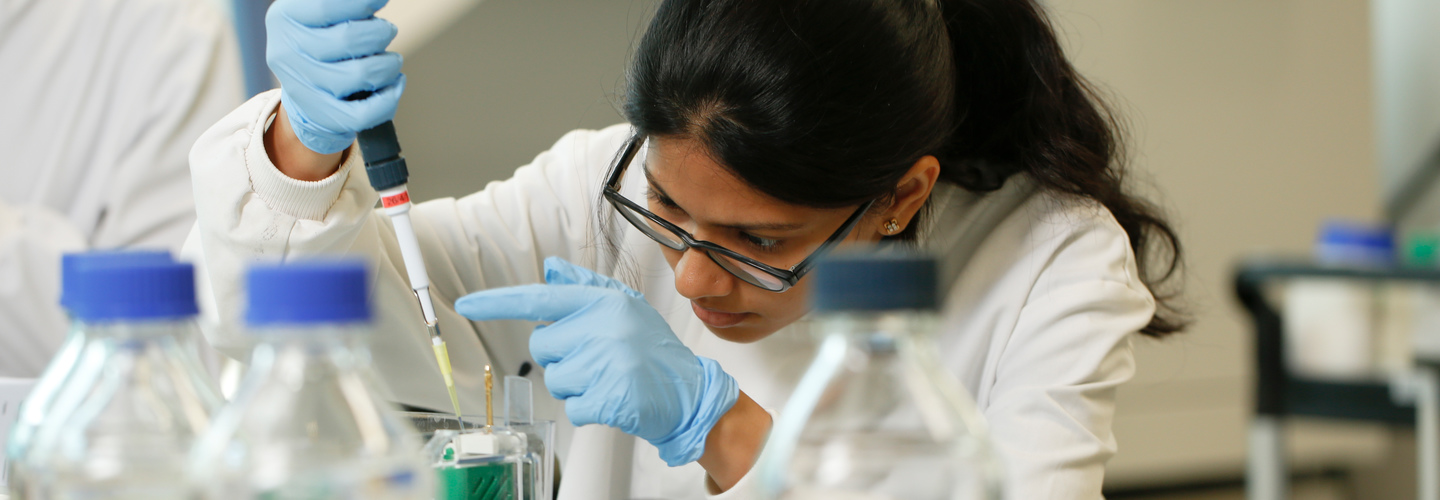Sign up for updates
Interested in studying at the University of Hertfordshire and want to sign up to our mailing list to learn more about our facilities, living in the UK and student life? Use the form below and our team will also keep you informed of key updates such as events near you, applications opening and more!
BSc (Hons) Pharmaceutical Science
Key information
-
Typical offer:
Entry requirements -
Fees: See below
Full details -
UCAS code: B202
-
Institute code: H36
-
Study abroad option
-
Work placement option
Find out more
Why choose this course?
- 4th in the UK for pharmacology (Daily Mail University Guide, 2025)
- 98% satisfaction for learning opportunities (NSS, 2024, based on the average of Q5-9)
- 1st in the East of England for medical technology and bioengineering (CUG, 2025)
Want to get hands-on? You’re in the right place. Because at Hertfordshire, that’s exactly what you’ll do. We teach pharmaceutical science in small, supportive groups, based in real labs, equipped with outstanding industry technology. Every step of the way you’ll build the skills today’s employers really need. We know, because we asked them. In fact, we designed our entire course in collaboration with the biotech and pharmaceutical industries.
Our inventive, inspiring teaching team has an outstanding reputation and a strong research ethos, pouring their internationally acclaimed discoveries straight into your learning. So, whether you want to design new drugs, bring brilliant discoveries into the real world or champion patient safety, you’ll be studying as part of a vibrant, supportive scientific community.
In your first couple of years you can take advantage of peer-to-peer mentoring from final-year students, and throughout the course you’ll get the chance to go to eye-opening events and gain career insights from visiting experts and inspiring alumni. Fancy some phenomenal transferrable skills? You’ll get those too – from making presentations and working with others, to brilliantly managing your time.
What are the facilities like?
Outstanding. This course is based in our modern, fully-equipped science building, where you’ll get hands-on in specialist labs and suites dedicated to making medicines including working in pharmacology, cell biology, synthetic chemistry, analytical chemistry, formulation development and sterile manufacturing.
We continually invest in industry-standard equipment and you’ll have access to the latest software, clinical journals, dedicated learning spaces and the University’s 24/7 Learning Resource Centres. During your second-year studies, you’ll get to use Oculus Quest VR headsets which enhance your learning through 3D experiences. You’ll be able to use the headsets to ‘walk inside’ a protein to learn and see how drug molecules behave in the protein, how they can bind to a receptor, and how they can be manipulated to make changes. The headsets are a fun and interactive way of learning, which will help you get to grips with the biomechanical process of how drugs work, and we’re proud to be at the forefront of using such innovative technology within our teaching environment.
Like to pave the way for powerful new treatments? Want to help patients lead better lives? We’ve got everything you need right here at Herts.
What's the course about?
Your first year gives you a solid grounding in pharmaceutical science. You’ll find your feet in the lab and the library – learning experimental techniques, getting to grips with powerful data and analytical tools. Together, we’ll explore human physiology and biology, biology and biochemistry, pharmaceutical chemistry and the fundamentals of analytical chemistry. Together, these subjects will help you understand how to make medicines, how they work in the body and how to ensure they’re safe.
In your second year, you’ll put that learning into practice. It’s your chance to explore drug discovery and formulation, make medicines and natural products and design advanced treatments using artificial intelligence. You’ll also study lab practices, how to make sure drugs are safe and viable, and how they metabolise in people’s bodies.
By the end of the year, you’ll have the scientific know-how, lab skills and analytical abilities to secure a powerful placement year. This option is a great way to pack your CV with practical experience and insights before coming back for your final year with us.
Study abroad/work placement option: Recent students have taken placements in research institutions, healthcare companies, agrochemical organisations, environmental agencies, and pharmaceutical and biotech companies. Like to join them? We’ll help you find a great opportunity. Want to study abroad instead? We can open exciting doors, all over the world, with recent students going to the US, Mexico and Spain.
You’ll spend the first 12 weeks of your final year in the lab full time, working on a real-life research problem that will help you hone your lab and research skills. Finally, you’ll spend your last semester studying a simulated regulatory science module, examining how medicines are translated from the laboratory to the clinic and specialising in either medicine design or formulation development.
Find out about our Pharmaceutical Science staff
Your main campus is College Lane
This is where the creative arts, science and health-related subjects are based. This means you’ll share the campus with future nurses, scientists, artists and more. You can use the common rooms to relax with friends, work out in the 24-hour gym or have a drink in our on-campus pub or cafes. We also have restaurants for you to eat in or grab something on the go. Our Learning Resources Centres are open 24/7, which means you can study whenever suits you best. Want to pop over to the other campus? You can take the free shuttle bus or walk there in just 15 minutes.
What will I study?
Degree programmes are structured into levels, 4, 5 and 6. These correspond to your first, second and third/final year of study. Below you can see what modules you’ll be studying in each.
